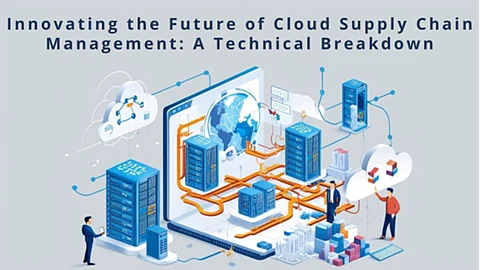

In a rapidly evolving digital landscape, cloud computing continues to reshape industries worldwide, particularly in the field of supply chain management. As organizations quickly adopt this transformative technology, the latest analysis by Natasha Mohan examines how innovations in cloud infrastructure are tackling long-standing challenges. By integrating advanced technologies such as blockchain, edge computing, and quantum computing, the cloud is boosting efficiency, security, and resilience throughout supply chains.
Many organizations experience vendor dependency and vendor management issues related to cloud deployments. In fact, research shows that vendors can cause an average delay of 4.2 months focused solely on vendor management. Procurement cycles can take as long as 52 weeks for critical items, such as processors and storage.
As a result of recognizing the inefficiencies of cloud deployments, organizations are employing hybrid cloud models and using multiple cloud providers to mitigate risk as well as increase their options. Multi-cloud deployments increase operational resilience and disaster recovery by up to 40%. Integrating systems, especially legacy systems with new cloud platforms can be complicated by a lack of standard protocols. Significant planning will require standardization and protocols to help eliminate integration issues.
As firms move supply chain processes to the cloud, security takes center stage. A recent review revealed that 89.3% of firms faced a compromise in their security in the past twelve months, costing businesses an average of $3.92 million per incident. To combat risk, they are investing in better encryption, multi-factor authentication, and distributed ledger technology (e.g. blockchain). Blockchain is particularly helpful, as those that adopt it early report 67.4% increased transparency and 52.8% less fraud. Together, these technologies help to protect their sensitive data field and create trust between participants in the supply chain.
Artificial intelligence (AI) and machine learning are leading the way for cloud-based supply chain innovation. By utilizing AI analytics, companies can increase the accuracy of their forecasting and predictive models. AI systems are helping companies make more informed decisions by constantly analyzing huge amounts of data in real time, and demand forecasting has improved by 44.5% across industries.
In addition, AI-driven tools help with the optimization of supplier relationship management by recognizing potential disruptions and managing risks before they happen. For example, a predictive automation system can slab potential delays or an inventory shortage. This action allows enterprises to make faster decisions now, avoiding future bottlenecks in their operation. The predictive component is proving invaluable with more elaborate global supply chains.
Cloud-based ERP systems are transforming supply chain resilience by improving vendor management and operational efficiency. Organizations utilizing these systems have experienced significant reductions in procurement costs and supplier response times, with resilience improvements of up to 64.8%. The ERP solutions have incorporated early warning integrated systems that forecast disruptions and reduce the response time from days to hours.
Automated procurement analytics create efficiency in decision-making by reducing the time to vendor review and procurement cycle time. These cloud based ERPs allow that organizations have continuous visibility and control of inventory, shipping, and supplier performance in real-time.
